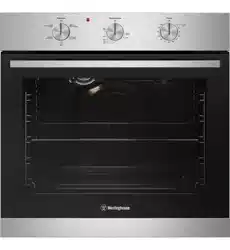Loading ...
Loading ...
Loading ...

11USING YOUR OVEN
Operating your oven temperature selector
A thermostat controls the temperature in your appliance.
The temperature can be selected within the specified
range. To set the temperature, turn the temperature
selector in a clockwise direction to the desired setting. An
indicator light above the temperature selector will come
on. When the set temperature is reached, the element
switches off and the indicator light goes off. When the
oven temperature falls below the set temperature, the
element switches on and the oven indicator light comes
on again.
CAUTION
Once the food is cooked, turn the temperature selector
back in an anti-clockwise direction. Do not force it right
round in a clockwise direction as this will result in damage
to the thermostat.
NOTE: For multifunction ovens the desired cooking
function must be selected before the oven will operate.
Once the desired function has been selected, use the
temperature selector to set the required temperature.
Pre-heating your appliance
For best results when baking you must pre-heat the
oven for 30 minutes. Pre-heat the grill for 3 minutes to
obtain best results. Pre-heating your appliance allows it
to reach the required temperature quickly and efficiently.
When baking bread or cakes, load the oven as quickly as
possible after pre-heating and leave the oven door open
for the shortest time. This will minimise loss of heat from
the oven and ensure the best results.
IMPORTANT
Cooling/Venting fan
This appliance is fitted with a cooling fan. This prevents
your kitchen cabinet from overheating and reduces the
condensation inside the oven. It will operate whenever
you are using the oven and blow warm air across the top
of the oven door.
Condensation and steam
This appliance is supplied with an exclusive system which
produces a natural circulation of air and the constant
recycling of steam. This steam makes it possible to
cook in a steamy environment ensuring that dishes are
soft inside and crusty on the outside. This process also
reduces cooking time and energy consumption. During
cooking, steam may be produced and released when the
door is opened. This is absolutely normal. When food is
heated, it produces steam in the same way a boiling kettle
does. When steam comes into contact with the oven door
glass, it will condense and produce water droplets. To
reduce condensation, ensure that the oven is pre-heated
before placing food in the oven cavity. It is recommended
that condensation is wiped away after each use of
the oven.
The effects of dishes on cooking results
Dishes and tins vary in their thickness, conductivity, colour
etc. which affects the way they transfer heat to the food.
• Aluminium, earthenware, oven glassware and bright
shiny utensils reduce cooking and base browning.
• Enamelled cast iron, anodized aluminium, aluminium
with non-stick interior and coloured exterior and dark,
heavy utensils increase cooking and base browning.
• To increase base browning simply lower the shelf
position. To increase top browning, raise the
shelf position.
• Always place dishes centrally on the shelf to ensure
even browning.
• Single level cooking gives best results in conventional
modes. If cooking on more than one level use a fan
cooking function.
Loading ...
Loading ...
Loading ...
